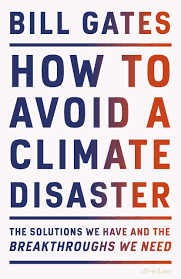Gates' How to Avoid a Climate Disaster: The Solutions We Have and the Breakthroughs We Need (2021) is well written. The book seems to aim for an audience that has had minimal engagement with climate change conversations. The first chapter sets the scene for the author's positionality, followed by a few chapters on climate science 101. For those moderately versed in the climate conversation, these might be skimmed. Chapters 4 to 9 present the crux of the subtitle, available solutions and needed breakthroughs. Unsurprisingly, the book takes a technological focus on mitigation, and admittedly it offers little on politics, economics, values or societal transformation.
This book was not on my reading list, but I picked it up after a guest lecturer made mention of it positively. I was most interested in the proposals (Chapters 4-9). In Ch 4 we get nuclear, offshore wind, hydrogen, carbon capture, amongst a few others. The chapter raises some interesting points that infrequently come up in transition conversations, such as all the infrastructure requirements - from massive transmission systems to housing electrical services (we tend to focus on supply infrastructure and use, not distribution). Gates does not much engage with all the metals required for the proposals to occur. Ch 5 reiterates the point as an enabler for changing how we produce products and raises the challenge of cement as a GHG producer with no simple replacement. Ch 6 grapples with agriculture and land use, calling for changing foods (artificial and lab meat) and reducing food waste; it points to the challenges of fertilizer and deforestation. Ch 7 covers transportation and calls for electrofuels, advanced biofuels and electrification all around, but does not really contest how the system works nor where all those metals are to be sourced (nor the injustices in the extractives sector). Ch 8 deals with heating and cooling; proposals are clean electricity and efficiency. Ch 9 delves into adaptation, which includes a pitch for CGIAR and agricultural research, with an emphasis on tech solutions; calls for climate smart city planning, restoring ecosystems, desalination, climate financing and a cautious bit on geoengineering. Ch 10 touches on "smart energy policies"; some recap from previous chapters, a call for research, and a wide range of brief points. Ch 11 has "the plan": research (more, high risk/high reward, prioritized); market shifts (governments lead via incentives, regulation / standards, price carbon). Ch 12 concludes with what "we" do, citizens, which include advocacy and personal adjustments.
Given that Gates has been involved in some experimental blue skies work, one surprise is how inside-the-box much of this book is. Keep driving (electric), keep flying (advanced biofuels), keep your diet (lab grown meat), make minor adjustments (reduce food waste, energy efficient heating/cooling); whether it was intended or not, the message is not all that demanding nor urgent. There is no talk of serious redistribution (beyond the charity model). There is no talk of climate justice. Quite comfortable. Even so, if Gates is keen on this messaging spreading, why not make the book open access? It does not appear that Gates is in need of book sales revenue, why not make it accessible to more people? That would align with the Gates Foundation position on open research...

